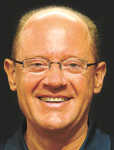General Transportation Service merges with SEK-CAP

Representatives of General Public Transportation and Southeast Kansas Community Action Program (SEK-CAP) met last week to finalize an agreement to continue providing public transportation in Fort Scott.
General Public Transportation provides transit services for the general public, senior citizens and disabled individuals, but in recent years increased expenses and decreasing in funding have created questions about continued public transit for the community.
"We get to go another year," Jacqueline Sellers, coordinator for the Bourbon County Senior Citizens, Inc., said.

The local Senior Citizens organization is the umbrella organization for General Public Transportation in Fort Scott.
"There was a decision by Bourbon County Senior Citizens to work with SEK-CAP to transition the (transportation) program to our control," Steve Lohr, executive director of SEK-CAP, said.
The transition will take place July 1.
The agreement
On May 12, Sellers and Deb Needleman, treasurer with Bourbon County Senior Citizens met with Lohr; Becky Gray, SEK-CAP's senior associate director of research, planning and grant development; and Jim Dockers, senior associate transportation director for SEK-CAP to hash out details of the memorandum of agreement.
"There is an official agreement between the two entities," Sellers aid.
"We've been working the past several months to secure through the Kansas Department of Transportation and integrate the match funding that they secure in the community and developing an agreement between the two groups, to continue the service the same as has been," Lohr said. "Only we operate the buses and the staff. Not a lot is going to change. We will be responsible for everything."
"They will be providing vehicle maintenance, paying the employees...they'll be our financial responsibility with transportation," Sellers said.
The phone number, drivers, dispatch and vehicles will all remain the same.
Drivers are Ronald Taylor and Gary Wise, dispatch is Sellers and Charlene Burns. General Public Transportation has two vans and a bus that seats 12. The transportation phone number is (620) 223-0750.
"We'll still do instant demand response, curb-to-curb, where they (SEK-CAP) do 24 hour response," Sellers said.
General Public Transportation will still have a need to raise money to match a Kansas Department of Transportation grant for public transportation, a KDOT 5311 grant, Sellers said.
"It (General Public Transportation) breaks down to $1,167 a month (paid to SEK-CAP)," she said. "We'll put down $9,000 initially to SEK-CAP, for a total of $29,000 for the year."
Funding
The KDOT 5311 grant for public transportation operation has to be rewritten every year, Sellers said
"Every year, we have to come up with 20 percent of our budget," Sellers aid. "We are going to continue to raise funds for our 20 percent."
Some of the money for the grant match is received from the riders who use the public transportation in Fort Scott.
"In a month's time we'll collect $1,000 to $1,600 per month from our clients," Sellers said. "Last year, we brought in $17,957 in passes from clients who pay for the transportation."
The passes cost $3 for one way and are used by Fort Scottians to go work, medical facilities and college.
"To make it easier, we've got a $30, 12-ride pass," Sellers said. "Starting July 1, round-trip passes can be purchased for $5, and there will be a six-ride pass for $15 offered."
Riders can pay the driver or come into the Bourbon County Senior Citizens Center at 26 N. Main St.
"We have some clients that buy at the first of each month, but likes to walk on nice days," Sellers said. "Some purchase passes for relatives. Around Christmas there is a big influx, as gifts for family members who don't have a car."
Insurance premiums
The impetus for the merger is insurance premiums tripling in recent years.
"A lot of insurance is dropping for smaller companies," Sellers said. "It's getting to be a lot harder because of premiums."
For the first six of the 10 years Sellers has been the Senior Citizens coordinator, the insurance premium was the same.
"We paid $2,000 a year. Then...$3,000 to $4,000 to $6,000 for a year," she said. "We can't pay $6,000 a year to insurance the vehicles."
Originally, Bourbon County Senior Citizens had an investment income donated from local resident, Tot Coyan, but a downturn in the stock market changed that.
"We had an investment from Tot Coyan before I came" Sellers said. "He died and left an investment for Bourbon County Senior Citizens. They were using the interest to pay the entire part. When the stock market went down, we lost a lot of money. The investment is gone. The last bit we had to cash in, in 2011, to keep going."
Between expenses going up and the stock market going down, public transportation in Fort Scott needed assistance.
Fort Scottians help
The community stepped in to help the problem.
Last year, Mercy Hospital donated $5,000; the Fort Scott Area Community Foundation gave $2,000; Rotary Club, $1,000; City of Fort Scott, $1,000; Visioning a Healthier Bourbon County, $900; Medicalodge, $823; UMB, $500; Don's Wine and Spirits, $250; Fort Scott Family Medicine and Kiwanis both $200; Gentry Law Office and Progressive Mothers Club both $100; First Methodist Church, $50; Atkins Insurance, $25 and numerous individuals also donated to the transportation service that General Public Transportation provides. This money was applied to the match money for the grant.
Just last week, First Presbyterian Church gave a $3,000 donation to the entity. Sellers said it will be used for next year's grant match.
"Without the matching fund, there is no transit services" Lohr said. "The community has to support it."
Rural transportation
Kansas Department of Transportation is looking at ways to help with the issue of rural transportation statewide, Lohr said.
"To be on the forefront of that planning," Lohr said. "SEK-CAP is poised to work with all of them. Transit is one of the things we do. We are the largest rural transportation provider in the state of Kansas, over a 100,000 rides in southeast Kansas. We can help alleviate some of the stresses a smaller group might have had."
